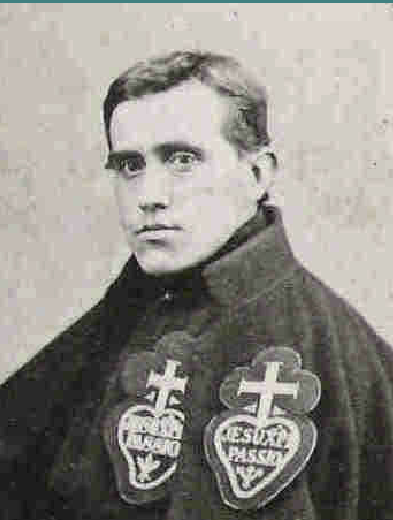Fr. CUTHBERT died on this day in 1917 in our Retreat of St. Anne, Sutton Oak, Lancs., having been a Passionist for 57 years and a priest for fifty.
He was born in 1840 at Langton, Lincolnshire, England, of an old-English-yeoman family, whose proud boast it was that it had never lost the Faith.

His parents were exemplary Catholics, and their one object was to bring up their children to love and serve God. There was not, (still isn’t in 1977) a Catholic church in Langton; so Mass was said for the local Catholics at the Hooker homestead. The chalice then used was (in 1917, at least) in the possession of the Passionists.
Trained in such a home, it is not surprising to learn that two of the sons became priests, and two of the daughters nuns. At first they had a Catholic tutor at home, but later went to a Catholic Boarding school.
Fr. CUTHBERT (GEORGE ROBERT he was in those days), went first to the Benedictines at Ampleforth, and later to the Rosminians at Rathcliffe College.
The family must at some time have moved their home to Broadway, for a note in the ‘Annals’ mentions their Dad’s giving a Christmas Box to the Passionists there: a cow and her calf! That was in 1859, and they were living in a cottage near our Retreat.
The January of the following year saw the two sons entering our Novitiate as clerical novices. On Epiphany day 1861, Cuthbert of St. Joseph and his younger brother (by about 2 years) FELIX of the Immaculate Conception, were both professed.
In 1879 (18 years later) Fr. Felix left the Congregation; and four years later Fr. Cuthbert transferred to our North American Province.
When he returned to the Anglo-Hibernian Province, the writer does not know. Under his Master’s (Fr. Salvian Nardocci) tutelage he became a real lover of the Rule and a strict observer of it. He regarded the priesthood in the light of St. Antoninus’ definition of it: ‘Sacerdos, id est, sacra docens’ (‘A priest is one who teaches sacred things’); consequently his greatest love was preaching. He also spent long hours in the confessional. His devotion to the sick was admirable: no matter how inclement the weather, he went his round of visits to them, until his own illness prevented his doing so.
The children loved him. On the very day of his funeral, without even a hint from their teachers, the children of St. Anne’s school made a collection among themselves for a Mass-offering for (their phrase) ‘dear old Father Cuthbert’.
Children are good judges of people’s character: Fr. Cuthbert’s life-style showed the realisation of his priestly and religious vocation. The words of Job (1:1) ‘…. a sound and honest man, who feared God and shunned evil’ (JB) was well applied to him in all truth.
Sources: Salvian Nardocci ‘Register’ No. 106 (&107)
Annals (Anglo-Hib) v.I p.365-366; v.III: 239
Obituary Notice 1917.09.03
Father Cuthbert of St. Joseph
On 3rd. September, 1917, at our Retreat at St. Anne’s, Sutton, St, Helen’s, Fr. Cuthbert of St. Joseph (George Robert Hooker), passed to his eternal reward, fortified by the last rites of Holy Church. He had been a religious seven and fifty years, of which fifty years were spent in the priesthood. Born in 1840 at Langton, Lincolnshire, of an old English yeoman family, whose proud boast is that it has never lost the Faith, his parents were most exemplary Catholics. Their one object was to bring up their children to love and serve God. There is no Catholic church in Langton, and Mass was said in the forties at the Hooker homestead. The chalice then used is now the property of the Passionist Fathers. Raised in such a house, it is not surprising that two of the sons became priests and two daughters entered religion. The children had a Catholic tutor and were afterwards sent to school. Father Cuthbert spent some years at Amplefort and Ratcliff Colleges: and in 1860 joined our Congregation. He was a strict observer and fervent lover of the Holy Rule that he had embraced. He regarded the priesthood in the light of St. Atoninus’s definition: Sacerdos, id est, sacre docens, and his greatest pleasure was to preach. Like every good priest he had an ardent zeal for the salvation of souls, and he gladly passed hours in the confessional. His devotion to the sick was admirable: no matter how inclement or cold the weather, he went on his rounds of visits till his own last illness prevented him. Little children loved him. On the day of his funeral, the schoolchildren of St. Anne’s, without a hint from their elders, collected amongst themselves to have a Mass said for the repose of the soul of “dear, old Father Cuthbert”. His life showed that he realised, in a vivid way, his priestly and religious vocation. Doubtless, in a much lesser degree, yet truthfully, his character could be summed up, as was Job’s ‘by the Lord’ Erat vir simplex, et rectu, ac timens Deum, et recenda a male – “He was simple and upright, fearing God and avoiding evil” (I:1)